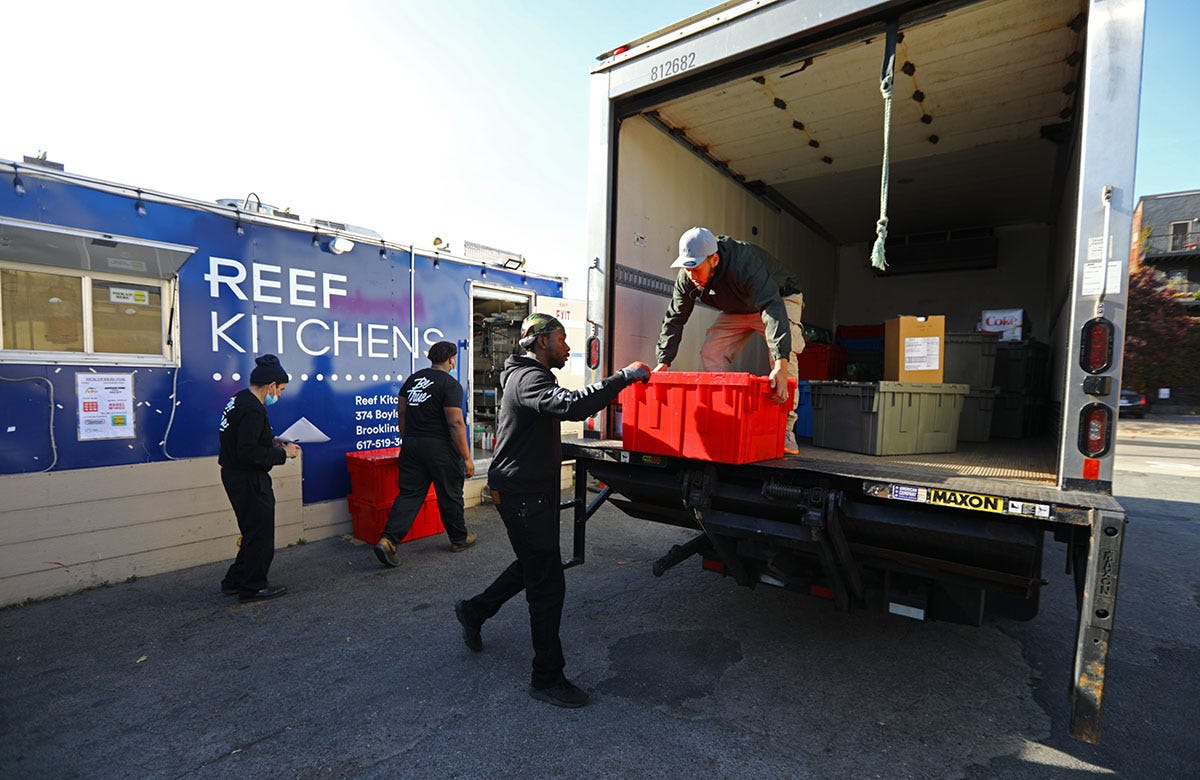In late 2020, ghost kitchens became the hottest topic in restaurants. I wrote about them. I moderated ghost kitchen panels at online events. I interviewed experts regularly. I talked about them on the news. The concept fascinated diners, often enamored by the model’s promises to restaurants: “Low overhead! Easy to launch! Test new markets! Who needs a dining room?!” Less than two years later, the halo is fading. We’ve moved post-ghost, a time when ghost kitchens are a ubiquitous part of restaurant growth strategy and the term starts to lose meaning.
The delivery business itself is having some trouble. NBC News recently declared “America’s obsession with pandemic-era food delivery appears to be over,” citing a return to in-person dining but also waning app popularity, potentially due to the increased fees associated with delivery orders as inflation in America balloons to new heights. US delivery companies’ stock prices are taking a hit and Grubhub’s parent company is shopping for a buyer.
Delivery success is predicated on growth — more restaurants, more consumers, more business. At the same time, new restaurant businesses are notoriously risky.
Enter: the influencer restaurant brand — the “side hustle” of the independent restaurant industry.
Last month, a company called Popchew announced a $3.6 million round of seed funding and hinted at its future plans: to help creators “build, launch and grow their own local, digitally native food brands nationally in a matter of weeks.” My clear skepticism about the business came through — Popchew’s co-founder emailed me promising there’s “more to [the company] than meets the eye.”
Popchew launched its newest food brand, SnapBack Kitchen, in mid-April. It’s a partnership with SnapBack Sports, a new-ish sports media company that got its start on Snapchat, creating a “digitally native food brand” marketed to sports fans “just in time for the NBA playoffs.” It’s serving food — like chicken tenders — from 37 locations in the US.
While all of this just seems like another celebrity-backed restaurant concept, Popchew’s co-founder and CEO Rushir Parikh told me he believes the relationships the company is building with creators will make all the difference. Those influencers, he said, serve as the marketing drivers for the new brands. That way, restaurants aren’t shouldering any marketing costs from third-party delivery — instead, online celebrities are driving business their way in the form of orders for influencer-associated wings and chicken tenders. The influencers, he said, start the all-important flywheel, generating the demand for the food.
Popchew is just one of the newest class of restaurant-adjacent companies set to capitalize on unlimited digital real estate and the power of influencers to mobilize their fans and followers online.
Virtual Dining Concepts, the company that will always and forever enjoy its association with the launch of MrBeast Burger, the extremely successful virtual concept tied to the extremely successful YouTuber, Jimmy Donaldson, a.k.a., MrBeast. In a year-and-a-half, the concept has scaled to 1,600 locations and is approaching $100 million in revenue. VDC just hired its first CEO, Stephanie Sollers joins the company after working at CloudKitchens and DoorDash. And, per Sollers’ LinkedIn, VDC is hiring for some high-level positions including a marketing vp and creative director, plus marketers and designers and some sales reps. That is: the concept creators tied to the content creators, none of whom actually order, make, or deliver the food.
There are more.




